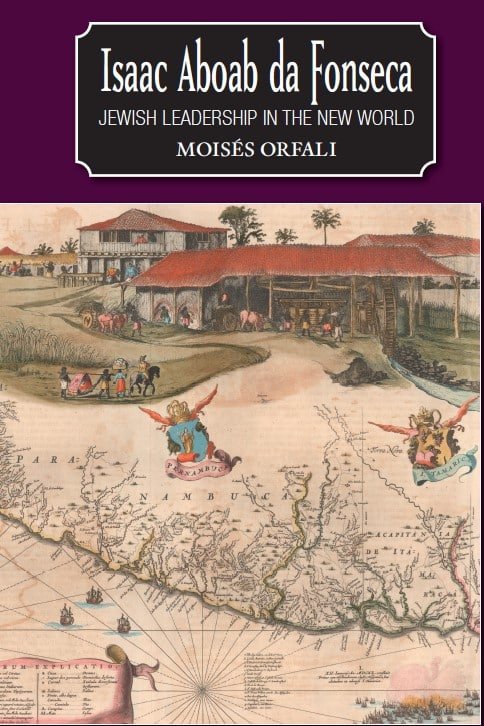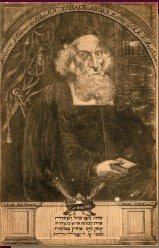
From 1642 to 1654 Isaac Aboab da Fonseca was the hakham (Torah scholar) and spiritual leader of the oldest Jewish community in the New World. As a Hebrew grammarian, poet, and mystic, as well as an excellent and very popular preacher, Aboab da Fonseca (1605 –1693) was not only one of the most interesting Jewish personalities of the seventeenth century, but his writings are an invaluable historical resource with regard to many aspects of Jewish life in Dutch colonial Brazil, the local attitudes toward Jews, and corroboration of events outlined in contemporary literary sources. His forebears were so-called New Christians, having undergone compulsory conversion to Catholicism in Portugal. In order to be able to live freely as professing Jews, in about 1612 the family moved to Amsterdam. In 1638 he was confirmed as one of the four hakhamim of the new congregation Talmud Torah of Amsterdam.
 In 1641/42 he accepted the nomination for hakham of the growing Jewish community in Recife, Brazil, where he was in charge of all rabbinical functions and gave lectures in Talmud and Hebrew. In the interim he wrote the Hebrew grammar Melekhet ha-Dikduk, published here in translation for the first time. In 1646 he wrote Zekher asiti leniflaot El, in which he described events in Dutch Brazil during the war.
In 1641/42 he accepted the nomination for hakham of the growing Jewish community in Recife, Brazil, where he was in charge of all rabbinical functions and gave lectures in Talmud and Hebrew. In the interim he wrote the Hebrew grammar Melekhet ha-Dikduk, published here in translation for the first time. In 1646 he wrote Zekher asiti leniflaot El, in which he described events in Dutch Brazil during the war.
Aboab da Fonseca enjoyed a few prosperous years until the Portuguese rebellion caused the economic ruin of the Jews of Dutch Brazil. His salary much reduced, he nevertheless remained to lead and help his people until the occupation of Recife by Brazilian-Portuguese troops on January 26, 1654. Upon returning to Amsterdam, his inclination toward mysticism made him one of the leading believers in the false messiah Sabbatai Zevi. But his writing and scholarship remained undiminished: he wrote sermons, responsa, judgments, obituaries, songs for inauguration of a synagogue, lamentations for Tisha be-Av, and more. He also published a Hebrew translation of the Spanish kabbalistic works of Abraham Cohen de Herrera, Casa de Dios y Puerta del Cielo, under the title Sha’ar ha-Shamayim (The Gate of Heaven). This scholarly monograph on Isaac Aboab da Fonseca and his intellectual and spiritual contributions includes discussion of his commentary on the Pentateuch entitled Parafrasis Comentada sobre el Pentateuco, as well as a consideration of Aboab’s involvement in the ban of Spinoza.
Moisés Orfali is professor emeritus of Jewish History and former Dean of the Faculty of Jewish Studies at Bar-Ilan University (Israel), where he has held the Rabbi Hayim Lau Chair for The Study of Leadership in Times of Crisis. He has authored various books and articles on historical and cultural aspects of Jews and conversos in the Iberian Peninsula and the Sephardi Diaspora.
Cover illustrations: Praefecturae Paranambucae una cum Praefectura de Itamaracá, Joan Blaeu, Atlas maior 1632. Sugar manufacture and refining, Pernambuco. Portrait of Isaac Aboab da Fonseca, print maker: Arneout Nagtegaal, 1686. Both images courtesy of the John Carter Brown Library at Brown University.
- HARDCOVER ISBN 978-1-84519-354-6
- RELEASE DATE April 2021
- HARDCOVER £65/$85.95
- EXTENT / FORMAT 224 pp. 229 x 152 mm
Books can be ordered by phone or online
The book is available at: Isaac Aboab da Fonseca (sussex-academic.com)
Ordering in the UK, Europe, Asia, Australasia, South America and Rest of the World
Gazelle Book Services
Direct sales tel.: +44 (0)1524 528500; email: sales@gazellebookservices.co.
Web ordering: www.
Ordering in the United States and Canada
Independent Publishers Group (IPG)
Direct sales tel.: (800) 888-4741
Web ordering: www.ipgbook.com
Bookseller Ordering
Information is provided under the Resources tab.
eBook Ordering
e-Book type availability can be sourced via www.ipgbook.com by book title. Kindle availability is via Amazon .com and .co.uk sites.
 eSefarad Noticias del Mundo Sefaradi
eSefarad Noticias del Mundo Sefaradi

